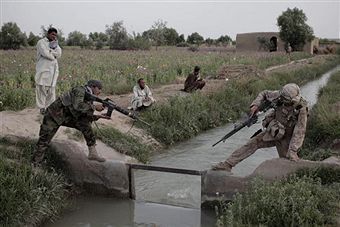 The Times went big on their story of Britain’s campaign in Helmand, and all the mistakes made in 2005 when the deployment was being
planned. It is a good piece of reporting, which adds to the volume of stories about the war, its planning and execution.
The Times went big on their story of Britain’s campaign in Helmand, and all the mistakes made in 2005 when the deployment was being
planned. It is a good piece of reporting, which adds to the volume of stories about the war, its planning and execution.
Britain’s effort Helmand, like the one in Basra, will in time need a magisterial study, a sort of multi-volume study like Winston Churchill’s The Second World War, which can weave the
front-line experience together with the turning of the bureaucratic wheels. But at least the first draft of history is now being written.
The articles make some mistakes and quotes people who did not participate in the planning of the initial offensive and will not have a detailed view of developments, like the otherwise excellent Major-General Andrew MacKay. They also do not give enough attention to political gaffes – such as the removal of Helmand governor Shir Muhammad Akhundzada, who was venal but effective, and his replacement by a succession of polished, but ineffective politicians, who the British desperately tried to anoint, in the words of one Helmand PRT member, “Princes of the South”.
But these are small problems. I was on the sidelines of the action at the time, both in London and Kabul, and on the whole the pieces seem very accurate.
The main issue that comes through the articles is not so much whether the Labour government was starry-eyed about the challenge in Helmand – that, surely, is no longer in dispute. Rather, the more important issue – and one that is still relevant today – is whether there is a culture of subservience, problem-dodging and reality-defiance among senior officials, who had no experience of post-conflict stabilisation and were reluctant to take outside advice from those who did.
In Britain there is little tradition, unlike in the United States, for examining the role of officials. Politicians like to blame other politicians – so they can maintain the idea that once they get their hands on the red boxes things will be much better.
If the whole system – the Departments of State, the Civil Service – is ill-equipped for 21st century tasks and needs reform, then the task is so much greater and more difficult. But it may be the case, when faced by 21st century warfare that the system and its operators, including the officials, need to re-think their roles, how they relate to outside experts and how they provide advice to ministers.
The expose should not only prompt the Cameron-Clegg government to ask serious question when they are given official advice, but also ensure that the Security and Defence Review looks at the bureaucracy’s readiness to learn lessons about past wars, and bring real expertise and honest advice to bear on the national security decision-making process.






Comments